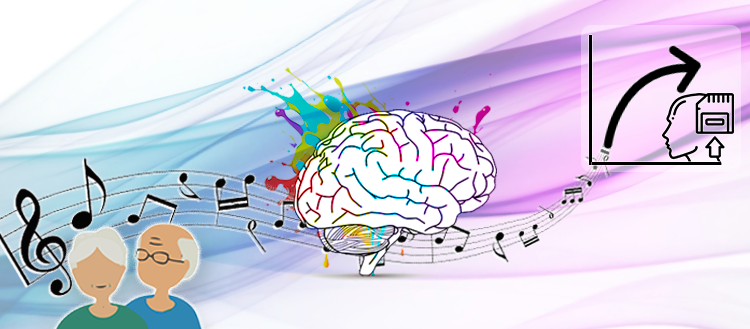Music can prevent cognitive decline, major study finds
As we age, our brains experience a natural decline in cognitive function, which is often accompanied by the loss of grey matter.

[Apr. 18, 2023: JD Shavit, The Brighter Side of News]
Side view of a brain. In blue, the areas affected by the increase in grey matter in the elderly as a result of music practice. (CREDIT: UNIGE - Damien Marie)
As we age, our brains experience a natural decline in cognitive function, which is often accompanied by the loss of grey matter. However, a new study from the University of Geneva (UNIGE), HES-SO Geneva, and EPFL has discovered that practicing and listening to music can alter this decline by stimulating the production of grey matter, opening new prospects for healthy ageing.
The results of the study have been published in NeuroImage: Reports.
The study was conducted among 132 healthy retirees from 62 to 78 years of age, who had never taken any music lessons for more than six months in their lives. The participants were randomly assigned to two groups: one group had piano lessons, while the other had active listening lessons that focused on instrument recognition and analysis of musical properties in a wide range of musical styles.
The classes lasted for one hour, and participants in both groups were required to do half an hour of homework each day.
Related Stories
After six months, the researchers found common effects for both interventions. Neuroimaging revealed an increase in grey matter in four brain regions involved in high-level cognitive functioning in all participants, including cerebellum areas involved in working memory. The performance of the participants increased by 6%, and this result was directly correlated to the plasticity of the cerebellum.
The scientists also found that the quality of sleep, the number of lessons followed over the course of the intervention, and the daily training quantity had a positive impact on the degree of improvement in performance.
However, the researchers also found a difference between the two groups. In the pianists, the volume of grey matter remained stable in the right primary auditory cortex, a key region for sound processing, whereas it decreased in the active listening group. Additionally, a global brain pattern of atrophy was present in all participants, suggesting that musical interventions cannot rejuvenate the brain but can only prevent ageing in specific regions.
Tonal working memory task: schema of the events characterizing one trial of the easy condition. From left to right, first, the participant hears a 3-tone pattern. Second, a visual cue indicating 1-2-3 appears. This cue predicts no change in the order of the tones between the first tone pattern and the following tone pattern. Third, the participant hears this second 3-tones pattern with the very same tones, either presented in the same order (true) or in a different order (false). Finally, the participant indicates whether the prediction of the visual cue was true or false. (CREDIT: NeuroImage: Reports)
The authors of the study believe that these playful and accessible interventions should become a major policy priority for healthy ageing. The next step for the team is to evaluate the potential of these interventions in people with mild cognitive impairment, an intermediate stage between normal ageing and dementia.
To understand the implications of the study, it is necessary to understand how the brain works and changes over time. Our brains are constantly remodeling themselves, with brain morphology and connections changing according to the environment and experiences we have. For instance, when we learn new skills or overcome the consequences of a stroke, our brains reorganize themselves to accommodate these changes. This process is known as "brain plasticity."
Locations of the cytoarchitectonic subdivisions of the primary auditory cortex TE1 areas used as region of interest (ROI) for the grey matter volume group comparison analysis. (CREDIT: NeuroImage: Reports)
However, as we age, this brain plasticity decreases, and the brain also loses grey matter, where our precious neurons are located. This is known as "brain atrophy." Gradually, a cognitive decline appears, with working memory, at the core of many cognitive processes, being one of the cognitive functions that suffer the most.
Working memory is defined as the process in which we briefly retain and manipulate information to achieve a goal, such as remembering a telephone number long enough to write it down or translating a sentence from a foreign language.
The study's lead author, Damien Marie, a research associate at the CIBM Center for Biomedical Imaging, the Faculty of Medicine, and the Interfaculty Center for Affective Sciences (CISA) of UNIGE, as well as at the Geneva School of Health Sciences, explains that the researchers wanted to select people whose brains did not yet show any traces of plasticity linked to musical learning. "Indeed, even a brief learning experience in the course of one's life can leave imprints on the brain, which would have biased our results," he says.
Note: Materials provided above by The Brighter Side of News. Content may be edited for style and length.
Like these kind of feel good stories? Get the Brighter Side of News' newsletter.
Joseph Shavit
Head Science News Writer | Communicating Innovation & Discovery
Based in Los Angeles, Joseph Shavit is an accomplished science journalist, head science news writer and co-founder at The Brighter Side of News, where he translates cutting-edge discoveries into compelling stories for a broad audience. With a strong background spanning science, business, product management, media leadership, and entrepreneurship, Joseph brings a unique perspective to science communication. His expertise allows him to uncover the intersection of technological advancements and market potential, shedding light on how groundbreaking research evolves into transformative products and industries.



